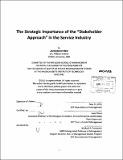The strategic importance of the "stakeholder approach" in the service industry
Author(s)
Nam, Joongkwon
DownloadFull printable version (9.086Mb)
Alternative title
Importance of "stakeholder approach" in service industry
Other Contributors
Sloan School of Management.
Advisor
Jason Davis.
Terms of use
Metadata
Show full item recordAbstract
In countries with a market economy it is generally agreed that companies should pursue economic profitability to survive and to provide shareholders with maximal value. The view is generally summarized as "the shareholder approach" in the management of businesses. However, not many people would disagree that companies also have certain social responsibilities. Unlike the shareholder approach, "the stakeholder approach" emphasizes responsibility over profitability and sees that company's success should be measured by the satisfaction among all stakeholders around itself, not by one stakeholder- shareholders. In this thesis, I examine how the stakeholder approach is beneficial for corporation's sustainability and competitiveness in the service industry by analyzing some empirical evidences in leading companies in it; Enterprise Rent-a-Car, Whole Foods, and Trader Joe's. In the service industry, companies can't help continuing interactions and relationships with all the stakeholders in daily business operations. Without supports from them, companies are hard to succeed. The analysis finds that the stakeholder approach is a legitimate management strategy and helps companies building trust and maintaining a sustainable competitive advantage, even giving better financial return in the long term.
Description
Thesis (S.M.)--Massachusetts Institute of Technology, Sloan School of Management, 2012. Cataloged from PDF version of thesis.. Includes bibliographical references (p. 110-113).
Date issued
2012Department
Sloan School of ManagementPublisher
Massachusetts Institute of Technology
Keywords
Sloan School of Management.